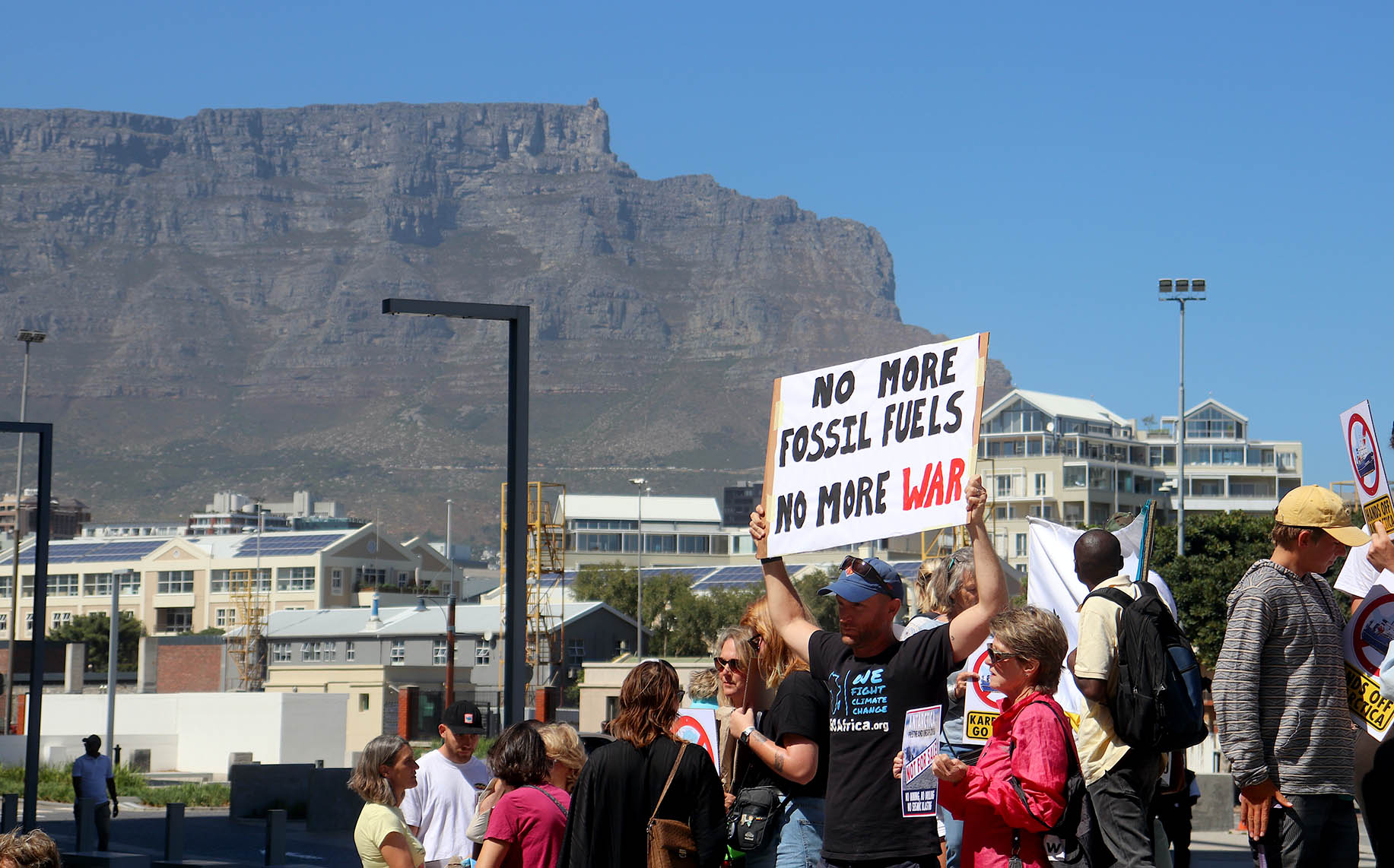A document obtained by Daily Maverick from Australia’s Ukrainian ambassador claims that Russian authorities have charged an Antarctic marine biologist with “high treason”.
The “crime” allegedly committed by Dr Leonid Pshenichnov, a passport-holding Ukrainian citizen since 1991? Preparing proposals with the “United States and the Anglo-Saxon bloc countries” to establish “extensive marine protected areas [MPAs] in the Antarctic region”.
“Implementation of these plans would,” the document says, “result in the loss of opportunities for Russia to exploit hydrocarbon resources on the continental shelf of Antarctica.” Antarctic mineral resource activities are outlawed under Antarctica’s indefinite “Article 7” mining ban, in force since 1998.
Such “plans” would also “allow foreign states to restrict the activities of the Russian Federation in promising areas of industrial fishing, to establish control over a strategically important sector of the world ocean”, the alleged charges note.
The document was first reported by ABC Australia and The Guardian this week during the meeting of the Commission for the Conservation of Antarctic Marine Living Resources (CCAMLR) in Hobart, Tasmania. The controversial 11-day event wraps Friday behind closed doors and was scheduled to discuss fishing limits and MPAs blocked by China and Russia in recent years.
Observers have repeatedly contended that the veto blockade is driven by fishing interests.
But coinciding with the start of the meeting last week, Daily Maverick revealed evidence connecting Russia’s self-confessed Weddell Sea oil and gas “prospecting” to its annual vetoes of regional MPAs.
Kremlin mineral explorer Rosgeo had probed West Antarctica’s “mineral resource potential” in 2011, 2012, 2015, 2016, 2017 and 2018. Our investigations have also shown that the explorer had passed through Cape Town to map East Antarctic oil and gas since at least 1998 — in multiple state sources claiming the presence of 70 billion tons of hydrocarbons in that region.
Antarctica’s ‘first political prisoner’
Now the Russian-born Pshenichnov has become “the first political prisoner in the history of Antarctica for opposing Russia’s overexploitation plans on the Southern Ocean”, claims a statement issued by Ukrainian authorities at the start of the meeting.
Reportedly arrested in Russian-occupied Crimea in September, Pshenichnov, aged 70, was scheduled to attend the high-stakes meeting as a member of Ukraine’s CCAMLR delegation since the mid-1990s.
/file/dailymaverick/wp-content/uploads/2025/10/Marine-biologist-profile-photo-1.jpg)
Ukrainian ambassador Vasyl Myroshnychenko told Daily Maverick that the document was received from Pshenichnov’s lawyer and family, but that it might not “represent the final version of the charges. It is difficult for us to say what form they are in now,” said Myroshnychenko, who supplied us with an additional document capturing a Ukraine statement to the closed Hobart meeting on the marine biologist’s arrest.
“After the case was presented at the CCAMLR meeting and became known to the broader international community, Russia made the proceedings closed, and it has now become extremely difficult to obtain case materials,” said the ambassador.
Daily Maverick was unable to reach Pshenichnov’s representatives in order to review a copy of the original charge sheet from Russia’s Federal Security Service (FSB).
Yet, the document supplied to Daily Maverick outlines an apparent campaign to prosecute Pshenichnov for “using his personal laptop” to perform duties legally mandated by the CCAMLR’s “ecosystem” approach, such as “preparing materials for an analytical report containing proposals to restrict krill harvesting”.
The “analytical report”, the document claims, was part of a Ukrainian strategy to limit Russia’s economic access to the Antarctic.
Daily Maverick contacted Russian Antarctic authorities for comment, but did not receive answers by the deadline. Russia’s Arctic and Antarctic Research Institute had not issued a public statement by publication.
Responses will be added if received.
Former US diplomat calls for marine biologist’s ‘immediate release’
William Muntean, Antarctic policy chief under the Biden and Trump administrations from 2018 to 2023, told Daily Maverick that allegedly accusing individuals of “treason and economic damage” for following policies approved by Russia risked consigning such “successful, decades-old” policies to the “dustbin of history”.
The senior former diplomat, now with the Center for Strategic and International Studies (CSIS), cited Russia’s “impressive” Antarctic history as an advocate of “scientific collaboration and freedom of scientific investigation”, as well as its commitments to uphold fishing restrictions and the mining ban.
Muntean urged treaty states to assess “whether the document justifying the arrest reflects the Russian government’s Antarctic policy”.
“If so, then it appears — based on the reported information — that its policy is to oppose scientific freedom and international scientific collaboration, support hydrocarbon exploitation and pursue unregulated industrial fishing,” said Muntean, who led the mining ban’s reaffirmation at the 2023 Antarctic Treaty consultative meeting in Helsinki, Finland. Russia also reaffirmed the ban.
“If not, the competent Russian government authorities should clarify their policies by correcting the arrest statement,” Muntean urged.
/file/dailymaverick/wp-content/uploads/2025/10/Not-welcome-Karpinsky.jpg)
Muntean pressed ATS states to consider “to what extent” Russia would “passportise” individuals by “making them a Russian citizen without their knowledge or consent”. The CSIS analyst also expressed concern about “arresting members of foreign delegations to ATS meetings due to their opposition to Russian government positions on Antarctica”.
“Under the current circumstances, it would be entirely reasonable for ATS parties to question whether they could safely invite representatives of the Russian Federation to future ATS meetings should it fail to immediately release the arrested Ukrainian marine biologist, Dr Pshenichnov.”
Meanwhile, after Daily Maverick’s multiyear probe into the Russian activities, the UK is moving to counter Russian mineral resource activities in Antarctica.
Westminster’s Antarctic inquiry of 2023-2025, which cited Daily Maverick’s investigations, concluded that mining activities in the South Pole region could cause “irreversible harm” to marine life — a potential violation under the CCAMLR’s constitution.
The inquiry recommendations, now to be codified into a formal strategy, also found that the true “nature and intent” of the Russian seismic surveys “cast doubt on compliance with the [Madrid Protocol’s] prohibition and risk undermining its authority”.
Pshenichnov is reportedly charged under Article 275 of Russia’s “Criminal Code”. Professor Klaus Dodds, a RAND Europe Fellow, told us the article was rewritten in 2012, “becoming this vast dragnet to capture anybody and anything that was judged to be hostile to the interests of the Russian Federation”.
South Africa recommits to ‘peaceful use’ principle
South Africa is an official Antarctic gateway that receives polar vessels from multiple states and entities — including Rosgeo’s Antarctic seismic vessel, the Akademik Alexander Karpinsky.
Noosfera, Ukraine’s polar research vessel, has sheltered in Cape Town harbour since the start of Russia’s full-scale, illegal invasion of Ukraine.
The Department of Forestry, Fisheries and the Environment told Daily Maverick it was committed to the ban.
Responding to questions on Pshenichnov’s arrest, the department highlighted South Africa’s role “as a founding member of both the Antarctic Treaty as well as the CCAMLR”. It said it “firmly recommits to the original principles of these agreements. Scientific investigations are included within the peaceful use principle and therefore [it] cannot support any position that contravenes these fundamental principles.”
/file/dailymaverick/wp-content/uploads/2025/10/Hands-off-Antarctica.jpg)
The alleged charges suggest that Russia is willing to criminalise scientists who advocate legally sanctioned conservation measures, said Dzvinka Kachur of the Ukrainian Association of South Africa.
Noting the marine biologist suffered from ill health, Kachur said: “The arrest of a scientist for proposing measures to protect nature marks a new level of cynicism demonstrated by the Russian government.”
‘Decisively chipping away at Antarctic governance’
“If the revelations from the Ukrainian scientist are true, they are, sadly, not the least surprising,” said Mathieu Boulègue, a Russian Antarctic security expert and senior Fellow at the Centre for European Policy Analysis.
“There is some truth that the Russian government is probably pursuing a not-so-secret agenda of potentially exploiting Antarctic resources when and if the opportunity arises,” Boulègue said. “Moscow seeks to ‘be there first’ in case the Antarctic falls victim to a scramble for resources — from fish to hydrocarbons, fresh water and critical minerals. Investigations have clearly demonstrated the willingness of Russian scientists to conduct more than ‘ocean science’ in the region.
“This adds to the Russian track record of bad ATS behaviour where the Kremlin has been decisively chipping away at Antarctic governance by weaponising science and systematically blocking or obstructing decisions that aim to preserve the region from harmful exploitation.”
Boulègue observed that, “when cornered or exposed, Moscow decides to ‘play ball’ with the ATS and cry ‘high treason’. Such is the hypocrisy of the current Kremlin leadership.”
The ‘twinkling green light’ of Antarctic mining
The Article 7 mining ban has no expiry date.
Yet, an optional review period — described as “a twinkling green light” — kicks in within less than 25 years.
That review period can be triggered by any treaty state, including Russia, at any point from 14 January 2048.
Professor Alan Hemmings, an Antarctic governance expert who presented a keynote address at the Polar Law Symposium in Greenland this month, has proposed legal pathways to make the ban immediately unchangeable for oil and gas extraction.
“Forgoing something that has not yet begun is relatively easier and ‘low-cost’ compared to commencing an unsustainable activity and subsequently seeking to halt it,” noted Hemmings of the University of Canterbury, New Zealand. He co-authored the 2022 proposal with Dr Patrick Flamm of Frankfurt’s Peace Research Institute.
“The present arrangement of Article 7 and a possible review in around 25 years leaves a ‘twinkling green light’ for possible future mineral resource activities,” they observe, “and thus is already having effect in the present.” DM





 Cape Town campaigners protest the arrival of Rosgeo’s Akademik Alexander Karpinsky in January 2023. (Photo: Jamie Venter)
Cape Town campaigners protest the arrival of Rosgeo’s Akademik Alexander Karpinsky in January 2023. (Photo: Jamie Venter)